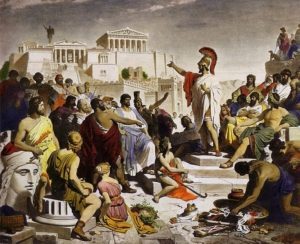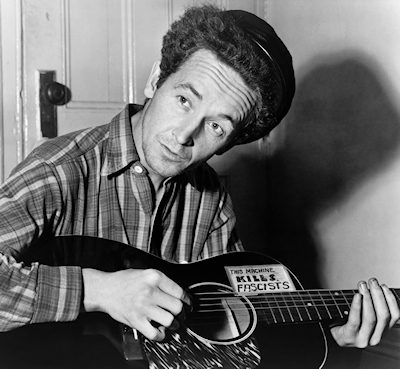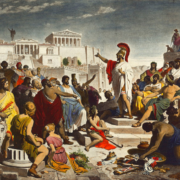REQUIEM FOR DEMOCRACY
REQUIEM FOR DEMOCRACY
In Memoriam Linda Huf, PhD
June 17, 1943—July 7, 2020

Pericles Gives the Funeral Speech (Perikles hält die Leichenrede), by painter Philipp von Foltz (1852).
Here are the great small “d” democrats in modern folk music: Woody Guthrie—the “Dustbowl Balladeer,” author of This Land Is Your Land, long-neck banjo player Pete Seeger, who wrote Where Have All the Flowers Gone, King of the 12-string guitar Huddie Ledbetter, who adapted Goodnight Irene, and going way back to the Civil War, America’s troubadour Stephen Foster, who wrote Oh Susanna, the song that Isaac Stern performed in Red China, with the entire People’s Republic of China Symphony Orchestra. Put them altogether and you have the leaders of the free world—once upon a time—those for whom America was synonymous with democracy.
If that no longer seems to be the case—if we now seem to be a nation divided against itself—far removed from either JFK’s New Frontier or Ronald Reagan’s “Shining City On a Hill,” then we may have “some ‘splaining to do.” Where O where has that America gone? On the eve of Election Day 2020, how have we gone from the most famous democratic country in the world to a requiem for democracy?
Let’s start at the beginning—with the pre-Socratic Greek philosopher Democrates, who famously said, “Todo está perdido cuando los malos sirven de ejemplo y los buenos de mofa,” All is lost when the bad ones serve as an example and the good ones as mockery.”
Ruth Bader Ginsburg was one of the good ones—and her illustrious example is now mocked by the president’s choice of Amy Coney Barrett as her “successor” on the Supreme Court—for the clear purpose of overturning Roe v. Wade and the Affordable Care Act. The fact that he developed Covid-19 after spending nine months publicly denying its existence—through 18 taped interviews with reporter Bob Woodward—only exacerbates our sense of outrage and futility at his brazen disregard of reality—in the face of 210,000 fatalities and counting from this disease. As Malcolm X reminded us, his chickens finally came home to roost.
In 1992, during the confirmation hearings for Clarence Thomas, on my 4th album Pigasus (named for Abbie Hoffman’s pig, when he levitated the Pentagon). It was first inspired by Linda Huf’s thesis, English Poet Laureate C. Day-Lewis in Two Worlds, which introduced me to his 1957 slim volume Pegasus and Other Poems. I wrote a song for the Supreme Court—established in 1789—called Nine Black Robes, to celebrate Justice Thurgood Marshall. Here it is:
NINE BLACK ROBES It started out a case like any other In a little country courthouse long ago He’d been inside a hundred and Thurgood Marshall wondered How long it would take to end Jim Crow
But this was Brown vs. The Board of Education And the year was 1954 When they outlawed segregation in public education Said separate wasn’t equal any more (and they wore)
Chorus: Nine black robes, nine black robes That’s the number and the color and the shape of hope Nine black robes.
Then Clarence Earl Gideon blew his trumpet And the year was 1963 Tried and imprisoned for the crime of petty theft He wrote to Washington, D.C.
With a pencil and a piece of prison paper Gideon dropped a bombshell in the mail He said even though I’m poor I should have had a lawyer And the Supreme Court heard his appeal. (He wrote to…) (Ch.)
Then Roe vs. Wade a poor woman In 1973 Arrested for an abortion, she took the state to court And they recognized her right of privacy
If you’re rich you can hire the best lawyer in the world If you’re rich you can send your kids to private schools to learn If you’re rich you can fly to Sweden for an abortion But if you’re poor you’ve nowhere else to turn (you turn to…) (Ch.)
So who’s going to fill Justice Thurgood Marshall’s shoes Who’ll stand between the lynch mob and the rights of the accused Or a back alley abortion and a woman’s right to choose— Liberty’s a precious thing to lose. (It takes …) Final Chorus.
“A precious thing to lose,” Liberty—that is my “Requiem for Democracy,” nowhere better exemplified than in the one national antiwar demonstration I participated in during the late great 1960s, sandwiched in between the three great marches of 1965—the SDS—Students for a Democratic Society—march of April 17 (where SDS President Paul Potter gave his “We Must Name the System” speech), the SANE/SDS march of November 27 (where Carl Oglesby delivered his “Trapped In a System” speech, which he described as “corporate liberalism,” and won the day.)—and the lesser-known “Assembly of Unrepresented People,” of August 6-9 to commemorate the 20th anniversary of the bombing of Hiroshima and Nagasaki. That’s the one I went to—with Jim Alexander, in his VW Camper-and heard Yale historian Staughton Lynd and author Norman Mailer speak out against the war long before it became popular to do so. We were all filmmaker Helen Garvey’s Rebels with a Cause. 1965 was also the year that LBJ passed the landmark Voting Rights Act that guaranteed Black Americans the right to vote, ending his speech with We Shall Overcome.
But none of those outshone the Pentagon March of October 21, 1967, in Arlington, Virginia, where Abbie Hoffman levitated the Pentagon—that’s the one my girlfriend Linda Huf went to—and forevermore gave me the brown blanket that protected her privacy when she had to pee during the proceedings. Her girlfriends hoisted it up overhead and turned their backs in deference to her modesty—then afterwards they gave her the blanket—which she most generously passed onto me—a genuine symbol of one of the great moments of her life—collecting as it did all the cherished memories of that unforgettable day—when a pig could fly, and Abbie’s amazing stunt—that elevated the antiwar movement into myth and legend—and Norman Mailer wrote Armies of the Night.
I mentioned at the beginning “small d” democrats to emphasize that I am not referring to the Democratic Party. Indeed, the “Call for An Assembly of Unrepresented People” opens with a prominent quote from a Republican president—and not Abraham Lincoln: “I like to believe that the people in the long run are going to do more to promote peace than our governments. I think the people want peace so much that one of these days governments had better get out of their way and let them have it.” –President Dwight D. Eisenhower, August 31, 1959. Coming from a five-star general, it has the ring of truth.
Then, in giant bold letters, the call opens with three words: “WE DECLARE PEACE.”
Two years later—when Linda was at the Lincoln Memorial with 100,000 others earlier on the day of the Pentagon March, she heard Phil Ochs sing his own defiant declaration: “I Declare the War Is Over,” even though the war wouldn’t end for another eight years. Pete Seeger was now singing Waist Deep In the Big Muddy, which he had planned to sing in September, 1967 on the Smothers Brothers Comedy Hour, Lead Belly—who passed away in 1949– would have been singing Bourgeois Blues. Woody would have been singing his own antiwar song (written during the Korean War) “I’ve Got to Know”—which Woody’s granddaughter Sarah Lee Guthrie sang unaccompanied at the Saban Theatre with Arlo in 2018—and was the highlight of the concert: “Why do your war ships sail on my waters/Why do your death bombs fall from my skies? Tell me why do you burn my farm and my town down/I’ve got to know, friend, I’ve got to know.”
And America’s Troubadour Stephen Foster would have been singing Hard Times Come Again No More. Upon hearing the president proclaim to moderator Chris Wallace that he “couldn’t guarantee a peaceful transition of power”—if he lost the election—the hallmark of our electoral system since George Washington was elected in January, 1789—one now realizes how very far we’ve come since those halcyon days of yore.
Woody Guthrie would have just passed away—on October 3rd, 1967. Democracy was in good hands then, which as Carl Oglesby reminded us, “Democracy is nothing if it is not dangerous.” How could we have been so blasé and nonchalant about it, so as not to recognize that it was in danger—and one day we would look out and it would be gone?
Back to October 21, 1967: Roughly 35,000 people marched across the Memorial Bridge toward the steps of the Pentagon. “Come gather round people wherever you roam…the times, they were a-changing.” Washington Star Special Writer Linda Huf (not on assignment) was there, and needed to go to the bathroom—of which there were none. So her fellow marchers held up a dark army blanket as a curtain, and she preserved her modesty behind it. She kept that blanket when the march was over, and eventually would give it to me as a keepsake.
Linda Huf was the writer and editor of their Readers’ Clearing House column which she did before she went on to graduate school at The University of Maryland, where she earned her Doctorate in American Literature. In that capacity she kept their readership entertained and moved with letters to the editor, which included her Vietnam Mailbag. While she was protesting the war here, at the same time she was reaching out to soldiers and sailors overseas and keeping their spouses engaged with an ongoing flow of correspondence doing everything from collecting books for them to making sure they weren’t forgotten at Christmas. She took the day off on Saturday to attend the antiwar demonstration but was right back at work on Monday—serving her Vietnam Veterans. Her most cherished possession was her plaque from the Vietnam Memorial Wall—which I brought to her service at Hillside conducted by Rabbi Jeff Marx—for Nicholas Krimont who died earlier that year after two weeks in Vietnam when he was fired on by the Viet Cong. He was killed in action on April 12, 1967. “April is the cruelest month,” wrote T.S, Eliot. Nick promised Linda that he would be careful not to kill anyone—unfortunately the other side was not so conscientious.*
But here is a quieter moment that didn’t make the papers, because poet Robert Lowell was also there, and—like Wordsworth’s Emotion Recollected in Tranquility—would later write:
The March 2
Where two or three were flung together, or fifty,
mostly white-hared, or bald, or women…sadly
unfit to follow their dream, I sat in the sunset
shade of our Bastille, the Pentagon,
nursing leg-and arch-cramps, my cowardly,
foolhardy heart; and heard, alas, more speeches,
though the words took heart now to show how weak
we were, and right. An MP sergeant kept
repeating, “March slowly through them. Don’t even brush
anyone sitting down.” They tiptoed through us
in single file, and then their second wave
trampled us flat and back. Health to those who held,
health to the green steel head…to your kind hands
that helped me stagger to my feet, and flee. (Sonnet from History, by Robert Lowell)
Did the march end the war? No~ not at first, but it was part of a movement that eventually would and did—in 1975. That’s what real populism looks like—not this faux imitation that put an arrogant, narcissistic braggart in the White House. Abbie Hoffman—co-founder of the Yippies—had wit, and imagination, and made the Pentagon steps full of protesters believe they had witnessed a miracle and seen the impossible—the Pentagon levitated in front of their very eyes. They sang America the Beautiful, and it truly never sounded so beautiful.
Pete’s banjo head said simply and profoundly “This Machine Surrounds Hate and Forces It to Surrender.” He would have been out on the front lines, still singing truth to power, as he did for Occupy Wall Street. Where is Pete’s banjo now, when we need it more than ever? Where is his 12-string guitar that he learned to play from Lead Belly, to sing Waist Deep on the Smothers Brothers—which after it was originally censored by CBS he finally got to sing on February 25, 1968? That’s the performance that inspired CBS News anchor Walter Cronkite to come on TV two days later to say the war was unwinnable and we were “mired in stalemate” to convince President LBJ not to seek reelection. Can a song change the world? This one did—it was democracy in action.
 And finally, where is Woody’s old Gibson guitar, where he stenciled on his manifesto, This Machine Kills Fascists—my requiem for democracy—unless you vote on Nov. 3rd!
And finally, where is Woody’s old Gibson guitar, where he stenciled on his manifesto, This Machine Kills Fascists—my requiem for democracy—unless you vote on Nov. 3rd!
As Ben Franklin replied when asked “What have you given us?” upon the conclusion of the Constitutional Convention at Independence Hall in Philadelphia in 1787—that led up to that first election of George Washington in 1789—“A Republic—if you can keep it!”
* Nicholas Krimont from Arlington County, Virginia, born July 3, 1941, died April 12, 1967, in Vietnam; served in the US Army, Private First Class, Infantry Indirect Fire Crewman, 1st Cavalry Division, 2nd Battalion, 5th Cavalry, Headquarters Company, Hostile, Killed in Action, Quong Ngoi, Awarded Purple Heart.
Dedicated to Ludwig van Beethoven, “The first great democrat of music,” born 250 years ago, December 16. 1770.
Linda Huf, PhD wrote A Portrait of the Artist as a Young Woman: The Writer as Heroine in American Literature, published by Frederick Ungar Publishing, New York in 1983—and still in print. Her manuscript Andy’s Shoes: An Auschwitz Survivor’s Story, co-written with Andy (Abraham) Nord, awaits publication; as does her novel Lily Whimple; cf. Legacy.com for her complete obituary. Rabbi Marx’s service was entitled Linda Huf’s Unfinished Song.
Ross Altman has a PhD in Modern Literature from SUNY-Binghamton (1973); belongs to Local 47 (AFM); serves as president of the Santa Monica Traditional Folk Music Club; he writes for FolkWorks—and he may be reached at greygoosemusic@aol.com













